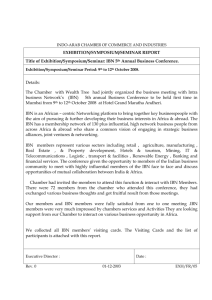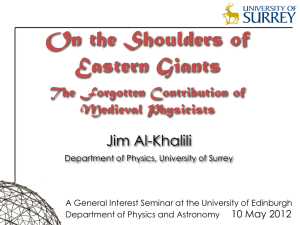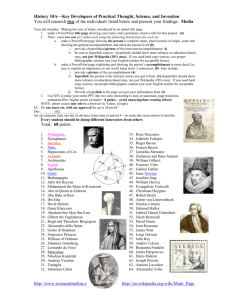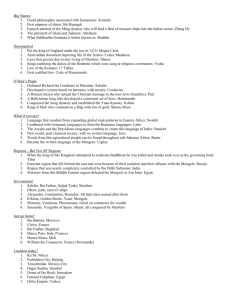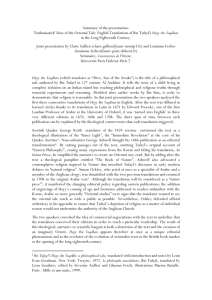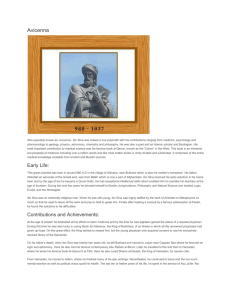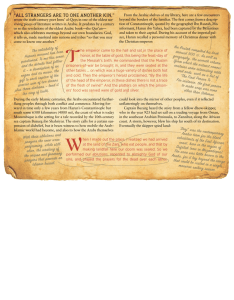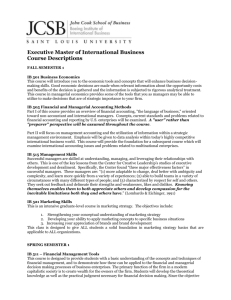Document 10465005
advertisement
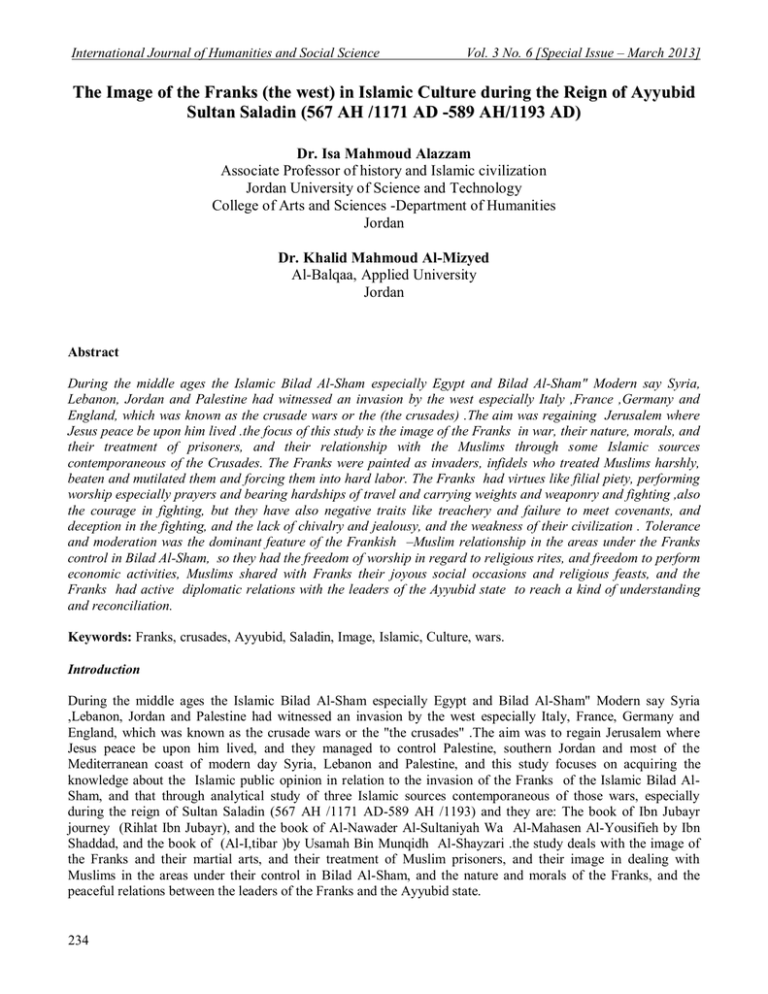
International Journal of Humanities and Social Science Vol. 3 No. 6 [Special Issue – March 2013] The Image of the Franks (the west) in Islamic Culture during the Reign of Ayyubid Sultan Saladin (567 AH /1171 AD -589 AH/1193 AD) Dr. Isa Mahmoud Alazzam Associate Professor of history and Islamic civilization Jordan University of Science and Technology College of Arts and Sciences -Department of Humanities Jordan Dr. Khalid Mahmoud Al-Mizyed Al-Balqaa, Applied University Jordan Abstract During the middle ages the Islamic Bilad Al-Sham especially Egypt and Bilad Al-Sham" Modern say Syria, Lebanon, Jordan and Palestine had witnessed an invasion by the west especially Italy ,France ,Germany and England, which was known as the crusade wars or the (the crusades) .The aim was regaining Jerusalem where Jesus peace be upon him lived .the focus of this study is the image of the Franks in war, their nature, morals, and their treatment of prisoners, and their relationship with the Muslims through some Islamic sources contemporaneous of the Crusades. The Franks were painted as invaders, infidels who treated Muslims harshly, beaten and mutilated them and forcing them into hard labor. The Franks had virtues like filial piety, performing worship especially prayers and bearing hardships of travel and carrying weights and weaponry and fighting ,also the courage in fighting, but they have also negative traits like treachery and failure to meet covenants, and deception in the fighting, and the lack of chivalry and jealousy, and the weakness of their civilization . Tolerance and moderation was the dominant feature of the Frankish –Muslim relationship in the areas under the Franks control in Bilad Al-Sham, so they had the freedom of worship in regard to religious rites, and freedom to perform economic activities, Muslims shared with Franks their joyous social occasions and religious feasts, and the Franks had active diplomatic relations with the leaders of the Ayyubid state to reach a kind of understanding and reconciliation. Keywords: Franks, crusades, Ayyubid, Saladin, Image, Islamic, Culture, wars. Introduction During the middle ages the Islamic Bilad Al-Sham especially Egypt and Bilad Al-Sham" Modern say Syria ,Lebanon, Jordan and Palestine had witnessed an invasion by the west especially Italy, France, Germany and England, which was known as the crusade wars or the "the crusades" .The aim was to regain Jerusalem where Jesus peace be upon him lived, and they managed to control Palestine, southern Jordan and most of the Mediterranean coast of modern day Syria, Lebanon and Palestine, and this study focuses on acquiring the knowledge about the Islamic public opinion in relation to the invasion of the Franks of the Islamic Bilad AlSham, and that through analytical study of three Islamic sources contemporaneous of those wars, especially during the reign of Sultan Saladin (567 AH /1171 AD-589 AH /1193) and they are: The book of Ibn Jubayr journey (Rihlat Ibn Jubayr), and the book of Al-Nawader Al-Sultaniyah Wa Al-Mahasen Al-Yousifieh by Ibn Shaddad, and the book of (Al-I,tibar )by Usamah Bin Munqidh Al-Shayzari .the study deals with the image of the Franks and their martial arts, and their treatment of Muslim prisoners, and their image in dealing with Muslims in the areas under their control in Bilad Al-Sham, and the nature and morals of the Franks, and the peaceful relations between the leaders of the Franks and the Ayyubid state. 234 The Special Issue on Behavioral and Social Science © Centre for Promoting Ideas, USA www.ijhssnet.com The first source of the study is Al-Nawader Al-Sultaniyah Wa Al-Mahasen Al-Yousifieh or what is known as the biography of Saladin by the Al-Faqih Al-Shafi, Baha, Eddin Abu Al-Mahasen Youseff Bin Rafe, better known as Ibn Shaddad, who was born in Mosul in 539 AH /1144 AD and was raised there, and died in Aleppo In 632 AH /1234 AD, and he acquired knowledge in (figh or Islamic jurisprudence) and sciences, and was known to be wise and balanced, and for those reasons he was dispatched in more than one ambassadorial trips to the Abbasid caliphate in Baghdad, and the sultan Saladin by the prince of Mosul, and in the year 583 AH /1187 AD he visited the holy lands to perform the Hajj(pilgrimage )rites, on his way back he visited Damascus hoping visit Jerusalem, so he was invited by the Sultan Saladin, who accorded him a great respect and rewarded him generously and asked him to enter his service .(Al-Dhahabi,1985,volume 3,p215), and he answered his call, and as he said " Allah made me like him a lot since I found in him an eagerness for jihad, and thus I liked him according to that , ( Ibn Shaddad ,1994 p 141) and he entered in his service since the year 584 AH /1188 AD until his death in 589 AH /1193 AD, and he assumed the office of military and Jerusalem jurisprudence ,and during his years with the Sultan he authored a book of the names of (Jihad) where he discussed the morals of Jihad in Islam, and the Koranic verses and hadith related to that with explanations of the difficult and strange concepts ( Ibn Shaddad ,1994 ,p 54), and he called his famous book know as Al-Nawader Al-Sultaniyah where he talked about the biography of Sultan Saladin and his wars with the Franks, and he presented a precise account about the public opinion in the Islamic world in regard to the Franks "the invaders", whether that related to their wars, morals or their nature or their treatment of the prisoners or the Muslims in Islamic lands under their control, and their contacts with the Islamic forces in Bilad Al-Sham, and he depended in authoring the book on the reliable narrators ,and his observations during his years with the Sultan Saladin ( Ibn Shaddad ,1994 ,P 141) . The second source is the book " Tathkirat Al-Akhbar An Itifaq Al-Asfar " known as the Rihlat Ibn Jubayr (The Journey of Ibn Jubayr) "by the Andalusian traveler Ibn Jubayr Abu Al-Hassan Mohammad bin Ahmad AlKinnani Al-Andalusi (died in 614 AH /1217 AD) ,who was born in Valencia (1) in Andalucía in 539 AH /1144 AD, and he studied Koran ,hadith and figh, and his fame in Islamic heritage was established through his books which were known by his name, he also wrote the summary of his experiences and observations of the countries that he visited in North Africa, Egypt, Bilad Al-Sham, Hejaz, Iraq and some the Mediterranean islands, and his travels took two years and three months and a half (Ibn Jubayr ,1981 ,P 284) that started in Shawwal in the year 578 AH /1183 AD, and ended in Muharram in the year 581 AH /1185 Ad, and died in the year 614 AH /1217 AD And he wrote in his diaries many of the political, military. economic, social, geographical of Bilad Al-Sham during the crusades era, and the importance of this study is evident because Ibn Jubayr had actually arrived in Bilad Al -Sham during those wars, and he entered some the cities there which were under the Frankish occupation and also described the conditions, and he dealt with the conditions of the Muslims and their relationship with the Franks, then he talked about the military and peaceful relationship between the Muslims and Franks in Bilad AlSham, so the events were in fact a reality that Ibn Jubayr had lived through, he also wrote and documented that in a penetrating vision and with accurate observation, and with high level of awareness in a beautiful literary manner, so he can be regarded as a witness and a testament of that era . In regard to the third source which is the book of Al-I,tibar by the prince poet Abi-Mozafar Mo,ayad Al-Dawlah Majd –Eddin Usamah Bin Murshed bin Ali Bin Munqidh Al-Shayrazi Al-Kalbi, and he was born in Shayzar castle North of Hama in the year 488 AH /1095 AD, and was raised there, and after the death of his father, he joined the Sultan Nour –Eddin Zenki (541 AH /1146 AD -569 AH /1173 AD) governor of Aleppo and Damascus, then he joined the Fatimids in Egypt, after that he returned to Damascus and participated in many of the of the raids on the Franks in Palestine, and visited many of the cities under their control, and he had a company with some of their knights, and in his book Al-I,tibar he gave an accurate description of Bilad Al-Sham during the crusades which shed a clear picture about the nature of the Franks and their expeditions, and died in Ramadan in the year 584 AH /1188 AD, and was buried east of the Qasioun Damascus (Ibn Khalkan, 1968, Volume 1, pp 195-199). 01 – The image of the Franks in fighting The war and the military confrontation had a reflection on the language of the street and the feelings of the people ,and it is usually evident in the language of the daily rhetoric, and we find that the Islamic sources contemporaneous of the of the crusades gave a very clear picture of the Franks which represented the Islamic public opinion with much clarity, and those sources described the Franks as invaders, and enemies of Muslims 235 International Journal of Humanities and Social Science Vol. 3 No. 6 [Special Issue – March 2013] ,and enemies of Allah, infidels and tyrants, and that because they mobilized their armies to the lands of Islam ,and occupied many cities in the Bilad Al-Sham foremost of which Jerusalem, and committed massacres in peaceful Islamic cities, and turned many mosques into churches in some cities like Jerusalem, Acre, and Tyre (Ibn Jubayr, 1981, pp255-256), and Ibn Jubayr mentions that a Moroccan converted to Christianity in the countries under their control, and Satan made him renounce Islam, and became an infidel and converted to Christianity …and he was accompanying Christians and acquired their morals ,(Ibn Jubayr ,1981, p 251-252) , so as we find out it was natural to describe them with those terms which reflect the extent malice and hatred towards them, as people throughout history refuse to submit to invaders and use the harshest of terms and words to describe them which shows what is inside their consciousness and thoughts . Ibn Shaddad is considered a testament and witness of the era, because he was at the heart of the event that is accompanying the sultan Saladin in most of his wars with the Franks, and he described them in his book as invaders, enemies of Allah and the nation, and infidels and tyrants, and talked about the courage of the sultan Saladin by saying : " and it was essential that he roamed around the enemy once or twice a day if he was close to them …and he was close to the enemy …and he never thought that the enemy numbers are great, and never and never aggrandized their situation at all "(Ibn Shaddad ,1994 ,P 51), and speaking about the attempt of the Franks to invade and occupy Egypt in the year 564 AH /1168 AD, he said: "and they became very fearful (Sultan Nur Eddin Zanki the governor of Damascus and his commanders) about Egypt falling under the control of infidels ,so they control all the whole countries" (Ibn Shaddad ,1994,p 77), and when the Franks were forced to leave Egypt he said: "and Allah made the Muslims victorious which compromised them …so loss became apparent and faith prevailed over infidelity, so they left as losers with sorrow"( Ibn Shaddad ,1994 , pp 84 -85), and after victory over the Franks in the battle of Hittin (near Tiberias)in Palestine in the year 583 AH /1187 AD and he said :"and Allah threw terror in the hearts of the infidels …and the people of Islam surrounded the people of infidelity and tyranny from all sides" (Ibn Shaddad, 1994, p 128), and when he talked about the princes of the Franks and their leader he usually cursed them using the Phrase "the curse of Allah" (Ibn Shaddad, 1994, p 233 ), and ibn Shaddad confirms that the Muslim princes and leaders when they were addressing Muslims and urging them to jihad usually said that the Franks are our enemies and the enemies of Allah, and they have to be expelled from the lands of Islam, so during the struggle over Acre with the Franks in the year 584 AH / 1188 AD, the sultan Saladin addressed his soldiers by saying: "let it be known to you that this enemy of Allah and our enemy ,and has come down to our country, and came treading in the land of Islam …and we should dismantle them, and Allah had made that a duty upon us"( Ibn Shaddad, 1994, p 177) . Also Ibn Jubayr who visited the Bilad Al-Sham during the crusades ere, during the reign of sultan Saladin, and describe the Franks as enemies, and repeated this phrase whenever he mentioned them, and when he talked about the people of Homs and their role in fighting the Franks he said: and the people of this town are known as experienced in fighting due to their proximity to the enemy" (Ibn Jubayr ,1981 ,p 208) ,and when he talked about Hisn Al –Akrad, which was one of the strongholds of the Franks near Homs he said : and it is a stronghold of the enemy " (Ibn Jubayr, 1981, p 209), and he also described as "the enemies of Allah the infidels" (Ibn Jubayr, 1981, p 253), and he repeated this phrase many times but in different forms " an infidel not believing in Allah " ( Ibn Jubayr, 1981, p 268), and described them as heathens (Ibn Jubayr, 1981, p 208), and when he talked about the princes and kings of the Franks, he also described them as infidels, and cursed them in many occasions by saying " The cursed king " (Ibn Jubayr, 1981, pp254,247 ), and described areas and Islamic cities under their control in the Bilad Al-Sham as the strongholds of the enemies, and called Allah for their destruction ,and when he talked about the city of occupied Acre when he said "the city of Acre was destroyed by Allah" (Ibn Jubayr, 1981, p 248), and he described the extent of Muslim sorrow for its fall, and Islam wept with tears in abundance, and one of his sorrows that its mosques were converted to churches, and the places of worship became the places where bells ring (Ibn Jubayr, 1981, p 249), and he called upon Allah to destroy the soldiers of the Franks (Ibn Jubayr,1981, p255 ) . The image of the Franks as it relates to Usamah bin Munqidh is not different from what was accounted by Ibn Shaddad, Ibn Jubayr, and he described them as infidels (Ibn Munqidh, 1987, p 66) ,and devils (Ibn Munqidh ,1987 ,p142), and was cursed many times by saying "may Allah curse them" (Ibn Munqidh ,1987 pp 40,67 ) ,and when they are defeated in fighting he says with abundance the phrase " may Allah fail them"( Ibn Munqidh ,1987, p 33), and this image of the Franks appear to be the common one in all the Islamic source and studies . 236 The Special Issue on Behavioral and Social Science © Centre for Promoting Ideas, USA www.ijhssnet.com Ibn Shaddad spoke about some of the martial arts of the Franks, which we do not find in the accounts of Ibn Jubayr or Usamah bin Munqidh, and he mentions that the Franks pitch their tents, and fortify with great accuracy " and the Franks when they arrive in a land, they establish great protection " (Ibn Shaddad,1994, p59), and when they go out to battle they divide the soldiers to starboard or left wing and center ( Ibn Shaddad ,1994 , pp 172,176 ), or front part, center and leg (ibn Shaddad, 1994, pp 269-270), or they go to fight taking the row formation, and they join each other, and the persons on foot protect the horsemen (Ibn Shaddad, 1994, pp 108-109),where the persons on foot surround the horsemen "like the erected wall, following each other " ( Ibn Shaddad ,1994 pp 167 168), and when someone is killed, then another soldier replaces the dead one and takes his place (Ibn Shaddad , 1994 p 150 ) . And they took turns to fight the people inside any city that they besieged, so some of the soldiers fight, and others take rest, so when the soldiers fighting felt tired, then the group which took rest replaced them, and whenever a group became weak then help came from the next group and so forth, so they protected each other, and in that Ibn Shaddad says in his account of the besiege of Acre by the Franks in the year 587 AH /1191 AD to wrest it from the Muslims" and the great numbers taking turns in fighting … the assault began from all sides, and were divided into many divisions, and they took turns in fighting so if a group felt tired, another group took its place, and they gave it a great start with fighters on foot and the horseman …and also with building circling walls around their ditches with men on foot and fighting day and night …with great perseverance in their formations not changing and not being bothered" (Ibn Shaddad ,1994 ,pp 269 -271) . Also Ibn Shaddad mentions some or the nature of the Franks in combat, where consultations for fighting is on horseback "and they gave orders to ten individuals of them and ruled over them, so any order was obeyed" (Ibn Shaddad, 1994,p 43),and in the fighting arena "whenever one of them got killed they buried him ,and whenever one them got injured they carried him, so no one after them who was killed or injured" (Ibn Shaddad, 1994, p59 ) ,and if there was a sea or a river then the dead were thrown there (Ibn Shaddad, 1994,175) so that the size of their losses are not known, and one of their habits was if they left a place to move to another place, then they set their fires" (Ibn Shaddad,1994, p 264). Also the Franks were always keen to maintain the flag raised in the battlefields, and the flag is among warriors like a great lighthouse, and Ibn Shaddad says: "and the flag of the enemy is hoisted and inserted on a wheel, and pulled by mules, and they protect the flag, also has great height like a lighthouse ,with white cloth ,and polished with redness on the form of crosses" (Ibn Shaddad,1994 ,p 226 ),and fighting is always in daytime, and there is no fighting in the night (Ibn Shaddad,1994, pp 128 ,184) . Ibn Shaddad talked about the Frank warriors, and he mentions that the knights and the men on foot fought with tenacity, and they wore what was known as (Al-Qabwah) which is a thick (helmet ) and also armored shields or coats, where they are hit by the arrows, and are not harmed, and they used the Zambourk "a kind of cannon" which injures the Muslim horsemen and their horses and their men, and I saw them in the back of a person, an arrow or even ten arrows piercing person and walking as he is not noticing anything which is a sign of hardened Franks" (Ibn Shaddad ,1994 ,pp 269-270), and the most notable of the weapons they use in fighting are swords, spears, arrows, Zambourk and stones (Ibn Munqidh, 1987, p 66), and Al-Jorokh which was a weapon to throw burning oil and arrows(ibn shaddad,1994,p82) . 02 -The image of the Franks in the treatment of prisoners. Ibn Jubayr accounts a very miserable and painful situation of the Muslim prisoners that he saw in the Frank city of Acre, where the prisoners were tied with iron, and are given the hard work considering them as slaves " and the calamity that had befallen on Muslims as they were tied with chains, and they are given the harshest and hardest of work as is the case with slaves, and female Muslim women their legs with iron rings, and hearts rent for them, but compassion avails them nothing (Ibn Shaddad, 1994, pp252-253), so the Franks treated the Muslim prisoners with harshness, and in many occasions they killed, and that what they have done when they overran most of the cities in Bilad Al-Sham such as Jerusalem ,and Marrat Al-Nu,man . During the Islamic –Frankish conflict over Acre in the year 587 AH /1191 AD and the attempt of the Franks to take it over from Muslims, the Franks attacked an Islamic ship towards the coast of Acre, and they sank it, and captured a great prisoners who were on the ship and mutilated them, and tortured them very harshly to extract information from them about the condition of the Muslim army (Ibn Shaddad, 1994, p 244), 237 International Journal of Humanities and Social Science Vol. 3 No. 6 [Special Issue – March 2013] and after the Franks controlled the city, they renounced their pledges, and captured three thousand Muslims, and tied them with robes ,and attacked with great force, and the killed them by stabbing and with swords (Ibn Shaddad, 1994, pp 262-263), and the Franks killed prisoners in other occasions during the conflict in Bilad AlSham (Ibn Shaddad, 1994, p 272), The Franks released prisoners sometime in exchange for money, and some rich Muslims and Muslim princes spent great amount of money in this endeavor, and sultan Nur-Eddin Zanki sent twelve thousand dinars as redemption of the Moroccan prisoners who came to the Levant in Jihad against the Frankish invasion, and Ibn Jubayr mentioned that two notable merchants namely Nasr bin Qaddam, and Abi AlDurr Yaqout Mawla Al-Utafi ,spent great amounts of money to redeem Muslims thee servants of Allah from the hands of the enemies of Allah the infidels (Ibn Shaddad, 1994, p 253), also Usamah bin Munqidh secured the freedom of Muslim prisoners many times from the Franks (Ibn Munqidh, 1987, pp 103 -104), and the cost of securing the freedom of the prisoners was very exorbitant, so it is mentioned that Usamah bin Munqidh bought back the freedom of one prisoners in exchange of five hundred dinars (Ibn Munqidh, 1987, p 89), and it was recounted that Muslims under Frankish control; played a significant role in hiding the Muslims prisoners who escaped from the Franks, and secured their arrival to Muslim lands or areas ( Ibn Munqidh ,1987, p 104 ) . Ibn Jubayr gave a sufficient space to talk about the Moroccan prisoners who were with the Franks, and they are the strangers detached from the their homeland now in the Levant, so they were particularly taken care of in terms of securing their release so they can return to their homeland, so he mentioned that Muslims in Bilad Al-Sham cooperated to secure needed money for that purpose "so the kings of those areas and the rich women and men ,spent money in this endeavor" (Ibn Jubayr, 1981, p 253). And about the treatment of the Franks prisoners in the Muslims lands Ibn Jubayr mentioned that he saw when he came to Alexandria in Muharram in the year 579 AH / April 1183 AD, prisoners form the Franks riding on camels and their faces towards their tails, and around them the drums and trumpets then they were killed and great number of prisoners from the Franks were killed too in Makah and Medina and other Islamic cities, and the reason was that they attacked Hejaz and they were intent to pull out the remains of the prophet Mohammad peace upon him from the holy tomb (Ibn Jubayr, 1981 ,pp 3132), so they were killed to serve as a lesson and a warning to the Franks, so all the prisoners of that invasion were killed . While the sultan Saladin did not kill the prisoners of the Franks that were captured in the city of Nablus and its environs and they were admitted into Damascus in the year 580 AH /1184 AD ( Ibn Jubayr, 1981, p 32 ), and Ibn Jubayr did not mention any torture of them or chaining them with Iron, but they imprisoned in some prisoners until their example with Muslim prisoners or releasing them, and Ibn Shaddad mentions that he saw the Ayyubid sultan Saladin and in many occasions giving lenient treatment of the prisoners of the Franks in clemency, so after the capture of barziyeh (7) in the year 584 AH /1188 AD the Sultan released all the prisoners that were brought before him, including the Frankish man castle (Ibn Shaddad, 1994, p 149), and upon the capture of Acre in the year 586 AH / 1190 AD he treated the prisoners of the Franks in a good manner and ordered food for them ,and accommodated them in tent near his own tent, and furnished them fur due to the cold weather, then ordered their transfer to Damascus "so they were carried there with dignity, and were allowed to send their friends and bring from their soldiers what they needs of clothing and other items" (Ibn Shaddad, 1994, p 299), and in the next year he captured forty five prisoners of the Franks in Beirut, and they sultan treated them with dignity, and released an old man who was among them (Ibn Shaddad, 1994, p 236) . But the treatment of the sultan Saladin towards the prisoners of the Franks changed After the Franks massacred all the Muslim prisoners in Acre in the year 587AH/1191AD, and so in many times where prisoner of the Franks were captured, the sultan ordered that were killed without mutilating them "and he was very angry about what happened to the prisoners of Acre" (Ibn Shaddad, 1994 p267 -269), and in the year 588 AD /1192 Ad, a prisoners was brought to the sultan and he ordered him killed by sword strike on his neck " due the rejection of the prisoner to enter Islam" (Ibn Shaddad, 1994, p 58), also a Frankish prisoner was captured and killed and burned as a response of killing and burning a Muslim prisoner by the Franks, and Ibn Shaddad says : "and when the fighting started they captured a Muslim, and they killed and burned him, and the Muslims captured one of them and they killed and burned him too and I saw both fires raging At the same time"(Ibn Shaddad, 1994 p 247). 03 –the image of the Franks in regard to nature and morals. Usamah bin Munqidh talked about some of the virtues of the Franks most importantly courage, and he was very much an admirer of their knights due to mixing with then very often, and seeing them in the battle arenas , 238 The Special Issue on Behavioral and Social Science © Centre for Promoting Ideas, USA www.ijhssnet.com since he was a notable …. So he says: "the Franks have no virtues but courage, and no one in higher place and status except the knights, and they are the ones with respected opinion" (Ibn Munqidh, 1987, p 87), and he says in another place: "they have the virtue of fighting and courage" (Ibn Munqidh,1987, p 151), and they are the most vigilant fighters in the war ( Ibn Munqidh,1987, p 40) "as for Richard the lion-heart who was one of great leaders of the third crusade (585 AH /1189 AD-588 AH /1192) that came to Bilad Al-Sham after the fall of Jerusalem by sultan Saladin in the year 583 AH / /1187 AD and was described by Ibn Shaddad as : He was a courageous man of sound opinion in war" (Ibn Shaddad,1994, p 64), "a man of valor, strong, adept in fighting ,and of sound experienced opinion in war" (Ibn Shaddad, 1994, p 238 ), also and he praised the Marquess, the governor of Tyre as a great man " a man of sound opinion and committed to his religion, and very strict" (Ibn Shaddad, 1994, p 156 ), and he mentions some of the heroic acts of one of the Frankish men during siege of Acre in the year 587 AH /1191 AD, in that he was adept fighting Muslims with great skill, and "he was hit with fifty arrows and stones and continued until hit by an burning oil bottle that burned him" (Ibn Shaddad, 1994, p 253), and he mentions that Frankish women has prominent roles in fighting during the attack on Acre, and there was a woman attacks with an arrows very strongly using a wood crossbow, and she hit a group of Muslim soldiers, so we surrounded her, and killed her, and took her crossbow, and took her to the sultan who was totally astonished about it" (Ibn Shaddad, 1994, pp 253 -254), and in another incident he recalls the killing of two Frankish women ,and taking another two women as prisoners ( Ibn Shaddad, 1994, p 199) . The Franks were distinguished in regard to their ability to bear the burden of travel, hunger, carrying heavy weights and arms, and patience in the fighting arenas despite the fact that they were invaders, (Ibn Shaddad,1994 ,p 271), and the fought with strength in the battles, and they do not seek safety unless they lost hope in victory ,then fearing being killed or captured, then they were quick to ask safety and surrender ( Ibn Shaddad, 1994, p 181) . Another virtue of the Franks that Ibn Munqidh records is the obedience to the mother and disobeying her ,where he mentions that one of knights asked him if his mother is still alive ,he said yes, and he said : do not disobey her (Ibn Munqidh, 1987, p 151), and another virtue of the Franks was the observance of prayer during fighting, so "in any place where the soldiers arrive, they erect a big tent and they make it as a church for prayer" (Ibn Munqidh, 1987, p 108). Islamic sources also talk about some of the negative points of the Franks like treachery whether in fighting or misleading the western public opinion to gain military an financial support, they also had religious intolerance, so when sultan Saladin recaptured Jerusalem in the year 583 AH / 1187 AD it caused a great and heavy impact on the Franks in Bilad Al-Sham so "they abstained from any pleasure and if they found anyone enjoying, they deserted him or her … in sorrow over Jerusalem …and they did not wear dresses for a long time, and they only iron …and they suffered from misery and grief" (Ibn Shaddad, 1994, p 193 ), so one of their great leaders the governor of the city of Tyre (the Marquess) drew a picture of Jerusalem on the paper, and he drew the church of the holy sepulcher, and the tomb of the Jesus peace be upon him ( according to their beliefs ) "so he had drawn the tomb and also drew a Muslim horseman over the tomb, stepping on the tomb, and “he sent the drawing to the markets religious congregations in Europe, so it was carried by the high level men of religion, and they called for holy war to aid the place of Jesus peace be upon him, and that source of their religion ,and upon that a huge number of people that only Allah knows became so moved and anxious"( Ibn Shaddad, 1994, p 208 ) . And also some of their negative points is treachery and failure to meet covenants, so in the year 579 AH / 1183 AD Arnaud who was the governor of Kerak (Al-karak) Frankish barony intercepted a trade caravan that was coming from Egypt to Damascus, and he looted the caravan and took as prisoners all men, and told them " Tell you Mohammad to save you" (Ibn Shaddad,1994 pp 69 -70) in spite of the agreement that allows free passage of caravans between the two parties, and in the year (587 AH /1191 AD) the Franks gave the pledge of no harm to the Muslims in Acre, and after they entered Acre they reneged on their pledge and killed three thousand Muslims ( Ibn Shaddad, 1994, p 262-263 ), another negative trait of the Franks was banditry and stealing, and Usamah bin Munqidh mentioned many incidents of stealing that the Franks had committed ( Ibn Munqidh, 1987 pp 92-93 ). In the area of the judiciary and rule among the Franks, it was the domain of the knights "and they are the men of the judiciary and rule" (Ibn Munqidh, 1987, pp87-88 ) or the priests (Ibn Shaddad, 1994, p 193) "and Usamah bin Munqidh mentioned that’s one of their verdicts reflect ignorance, he mentions that a man was accused of murder, so a hearing was set for him "and then they brought something like a big tank and filled it with water, 239 International Journal of Humanities and Social Science Vol. 3 No. 6 [Special Issue – March 2013] and they placed on top a wood panel ,and they tied the accused man , and that tied his shoulders and threw him in the water, so if he was innocent he will sink and then they pull him and not die in the water, and if he was guilty he will sink, so when he was thrown in the water he made sure not to sinks so he could not sink, so the verdict passed and they pointed his eyes with kohl (Ibn Munqidh, 1987, pp 158- 159) and then he lost his sight. And Usamah bin Munqidh mentions that the Franks had bad faith, and they saw the Jesus peace be upon him is the son of Allah ( Ibn Munqidh, 1987, p 154 ), also they aggrandized greatly the big cross, so Ibn Shaddad mentions within the events of the year 587 AH / 1191AD "a big cross was brought, and they saw the cross with aggrandizement , and they had thrown themselves on the ground, and with their faces covered with dirt, and they went on a great submission that was not seen before" (Ibn Shaddad, 1994, p 260) . And some of their bad traits as Usamah bin Munqidh mentions was lack of chivalry and jealousy comparing with the mummers and customs of Muslims, and in that he says: "they do not have something called chivalry and jealousy, so a man is walking with his woman and meets another man, so he takes his woman away and talks to her, and the husband wants until she finished her talk, and if she took long he just leaves and leaves her with the man she talking with" (Ibn Munqidh, 1987, p 154), and Usamah bin Munqidh mentions another incident that confirms the lack of jealousy, and that a Frankish man found a man in his bed with his wife, and after a discussion with the man he swore that if he came back again he with quarrel with him "so that was only the level of his jealousy and amazement" and he mentions that another Frankish man brought his wife to a public bath so that the bath boy can cut her hair, and after that he thanked him and gave him his pay (Ibn Munqidh, 1987, p 155) . Also Usamah bin Munqidh mentions some of the incidents that show the backwardness an weakness of the Frankish civilization during the middle ages, and some of these incident were in area of medicine where he mentions that a Frankish man has an abscess in his leg, and a woman that suffering from another illness, so the Frankish doctor treatment, was that he amputated the leg of the man using an ax which led to his death, and as for the woman he brought a razor and cut a cross on her head, and took off the middle part until the skull bones were visible to remove the devil from her head according to his belief, as he thought that as the cause of her illness, and that led to her death, and he recounts that some patients resorted to the men of religion for treatment, and he mentions a strange incident where one the priests treated one of knights by closing his nose with wax which led to his death, and when they told the priest that he died, he said that he was suffering so I closed his noose so he may die and not suffer anymore (Ibn Munqidh, 1987, pp 152-157), and needless to say that those incidents and other mentioned by Usamah bin Munqidh show the backwardness of the western civilization during the middle ages . Ibn Jubayr show impatience with the Franks and their morals because of the lack of harmony with the Muslim morals, and he regretted entering the Bilad Al-Sham cities under their control, and he warned Muslims not to enter those cities unless only for passage, because of the abundance of evil, and in that he says : "and there is no excuse from Allah to come through a town of the infidels save only for the purpose of passage , due to the hardships and calamities that those places suffer due to Frankish presence like: humiliation and wretchedness and reprehension, and also hearing what makes the hearts break by mentioning what Allah had sanctifies and made high, especially from their low ranks, and lack of cleanliness and being among pigs, and all forbidden things, and many other things that we cannot count, so beware of entering their lands" (Ibn Jubayr, 1981 pp 252) . so he called on Allah the almighty to forgive this sin, and Allah the almighty is the one responsible for forgiveness of this sin that was committed, and will not be disappear totally after remorse (Ibn Jubayr, 1981, pp 252-253) . And also Ibn Jubayr had become impatient accompanying even the peaceful Frank Christians, and they were the pilgrims to Jerusalem in his way via the sea from Acre to Andalucía "may Allah relieve us from their company the soonest with quick ease by the generosity of Allah" (Ibn Jubayr , 1981, pp 255-256 ) . On another account Ibn Jubayr described some of the feasts and celebrations of the Franks, so in on the night of the twenty fourth of Rajab 580 AH / 1184 AD, and while he was sailing with the Franks from Acre to Sicily, the Franks celebrated a feast that he did not mention its name, and in that occasion every person whether man or woman held a candle in his or her hand and even children and the ship became illuminated on top and bottom, and at the end of the feast the priest came forward to prayer with and reminded through a sermon about the commands of their religion (Ibn Jubayr, 1981, p 258) . And he described another feats which was the Christmas ,where they all celebrated men, women and children and he focused on the women and their dress, and the attire of the Christian women was like that of Muslim women: they spoke very well, and covered and went to this feats wearing silk dress ornamented with gold, and they covered with colorful cloths and wore walking shoes ornamented with gold, 240 The Special Issue on Behavioral and Social Science © Centre for Promoting Ideas, USA www.ijhssnet.com and they appeared in their churches putting all the ornament like the Muslim women and putting kinds or ornaments and perfume, and he did not complete the description fearing exaggeration, and we ask Allah a refuge from small talk and nonsense which leads to disarray, and we seek refuge from a restriction that leads to a refute , and Allah the almighty is forgiving (ibn Jubayr,1981,pp273-274) 04- The image of the Franks in treating Muslims in the occupied lands. Ibn Jubayr about the conditions of Muslims subject to Frankish occupation in some of the cities in Bilad Al-Sham, and he mentions that tolerance and moderate policy had prevailed over the Islamic –Frankish relationships, and when he visited the city of Banyas which was subject to Muslims ,and he mentioned that there was a fort knows as Hunin (8), and the lands located between them are farmed on both sides and the crops are shared in half "and the workers of that leveled land (9) is between the Franks and the Muslims, and they have something called a limit of sharing ,where they share the yield and their cattle is mixed and no injustice occurs between them" (Ibn Jubayr, 1981, p 246) . And he confirms that most villages and small hamlets of the Bilad Al-Sham coast or the cities in the interior where the inhabitants remained Muslim in spite of the Frankish occupation, and the Franks treated Muslims with tolerance and fairness, and to he added that their conditions under the occupation were better than the conditions of some of the Muslims subject to Islamic control ,and the lands were not taken away from them, but they retained those lands while in exchange they paid the Franks half of the crop yield annually and a tax per person with the amount of one dinar and five Qirats and a small tax on the fruit trees , and in that regard he says: "and we travelled from Tibnin (towards Acre)and in all our way there was connected hamlets and organized buildings, where all the inhabitants were Muslims, and they were, and they give half the crop yield when collected ,and a tax per person head tax "of one dinar and five Qirats, and they do not object to them, also they have a small tax on fruit trees which they gave to the Franks, and they have their houses and all their affairs are left to them (the Muslims), and all cities in Bilad Al-Sham coast are like that and that includes the villages and hamlets, and water was available for Muslims and their workers, and this represents a sudden misfortune in that Muslims complain about their compatriots ,but praise the behavior of the adversary the Franks and they feel good about the his justice"(Ibn Jubayr ,1981, pp 247-248). And some of the Islamic hamlets under the Frankish control had caretakers from Muslims, albeit the one loyal to the Franks, so during his account about a hamlet of Acre he said: "and the chief caretaker is a Muslim with high rank and level above other Muslims" (Ibn Jubayr ,1981, p 248), and this caretaker as he mentioned invited all the traders of the trade caravan that he accompanied, and he was offered them a big room in his house ,and offered them many kinds of food with good hospitality, and they enjoyed his generosity (Ibn Jubayr, 1981, p 248-249 ) . And Ibn Jubayr talked about a village east of Acre knows as Ayn Al-Baqar ,and that the Mosque Mihrab "the Hollow place in the Mosque" remained as it is, and the Franks placed a Mihrab for them, so both the Muslim and the infidel meet together there, and everyone takes his prayers direction ,and at the hands of Christians is a preserved area, and Allah maintained the location of prayer for Muslims"(Ibn Jubayr, 1981, p 249), and that what aroused Ibn Jubayr with amazement in many junctions in his travel . And when he visited the city of Tyre he described the conditions of the Franks and the Muslims by saying : "More clean than Acre in terms of cleanliness and roads, and the people there are lenient in manners, and more kind towards the Muslims strangers, and their manners are more kind and humane, and the conditions of Muslims are better, and as for Acre which is bigger, with more tyranny and infidelity" (Ibn Jubayr, 1981, p 250) . Also the Muslims under Frankish control had some degree of autonomy in dealing with disputes amongst them, so Ibn Shaddad when talking about the city Jibbilah said: "and they have Muslims resident there, with a judge who rules among them" (Ibn Shaddad, 1994, p 144) . And the Muslims shared with the Franks their joyful occasions and feasts, so Ibn Jubayr mentions that the Muslims of Tyre shared with the Franks one of the Joyful occasions that he saw in the city, and he described the bride and her attire and the attires worn by the women and men accompanying her, and he mentioned that the party was attended by a great number of the Frankish men and women, and they formed near the door of the bride, with the sounds of the trumpets and flutes, and the bride emerged between two men from her relative and 241 International Journal of Humanities and Social Science Vol. 3 No. 6 [Special Issue – March 2013] walking gracefully wearing the best of silk dresses, and on her head a cover with gold lined with woven with gold and the bride walks to house of her future husband with men in front and the women behind her while everyone, donned the finest clothes, and a feast was on the wedding occasion was prepared and attended by the Muslims of Tyre along with the Franks ( Ibn Jubayr, 1981, p 251 ) . Also some of the Franks were influenced by the morals of the Muslims, and in that regard Usamah bin Munqidh says "and some of the Franks have changed and mixed with Muslims", and some of them do not eat pork and do not allow it inside their homes, and besides they do not eat the Frankish food but only the Arabic food (Ibn Munqidh, 1987, pp 159 -160). 05 – The friendly relations between the leaders of the Franks and the Ayyubid State Ibn Shaddad talked about active diplomatic relations and friendly relations between the Frankish leaders and the Sultan Saladin and the princes of his state, especially in the third crusade, where messenger were sent between the two sides in a continuous manner, and it seems the purpose was determine the size of the military strength ,and in that Ibn Shaddad says :"and their purpose in sending messages was to know the strengths and weakness , and our offer to accept the messages was to know what they have too" (Ibn Shaddad, 1994, p 251), and he mentions elsewhere that the purpose of the messages "was to secure news by the frequent messages"( Ibn Shaddad, 1994 , p 243). The years 587 AH / 1191 AD , 588 AH /1192 AD, witnessed Active diplomatic contacts between the two sides, in the year 587AD/1191AD gave the King of the English Richard the Lion heart one of the leaders of the crusade gave the Sultan Saladin a Muslim prisoner as gesture of goodwill, and the messenger of the king went back to his master with dignity and honor, then the messengers of the king were came frequently to ask for fruits and Ice, also sultan Saladin used to send the messengers to the King of the English carrying precious gifts, perfume and clothes ( Ibn Shaddad, 1994 , pp 252 -260) . Also gifts were exchanged between the king of the English and the just king "Al -Malek Al-Adel “the brother of sultan Saladin and one of his leaders more than one time, and the contacts came to point when the two men actually met, and exchanged the gifts and food, and held discussions with friendliness and sure love "and even the king of the English presented his sister to the just king" Al-Malek Al-Adel, so that he marries her, and messengers were exchanged in this regard more than once, but the efforts failed because of the condition that the just king, Al-Malek Al-Adel converts to Christianity for the marriage to proceed, and that was rejected by the king (Ibn Shaddad , 1994 , pp 289-300) . Then the king of the English tried to meet Sultan Saladin and the messengers were exchanged, but the Sultan apologized unless an agreement or reconciliation is reached between them, where the Sultan said: "when kings meet then disagreement occur, and if the meeting goes well, and the meeting shall be solely to negotiate and important matter, and I do not understand your language and you do not understand my language, and we must have an interpreter …so that a conclusion is reached, and a common ground is achieved, and then the meeting is followed by friendliness and love" ( Ibn Shaddad, 1994, p 300-301 ) . The contacts had become more active to achieve an end to the conflict over Acre "and the messengers came frequently until the base is liberated and prepared ", and until an agreement t was reached to hand over Acre to Franks in the year 587 AH / 1191 AD (Ibn Shaddad ,1994, pp 257-261), and communication between them continued in order to reach a reconciliation agreement and end the third crusade, especially between the king of the English and the just Ayyubid king who was negotiation on behalf of his brother, to the point that the king of the English used to call the just king "Al-Malek Al-Adel “by the word my brother "which as we note reflects the level of friendly feelings between them, Say to my brother (that is Al-Malek Al-Adel) who knows how to reach the Sultan in regard to the meaning of reconciliation, and the negotiations were crowned with reaching the reconciliation of Ramle in the year 588 AH / 1192 AD that had put an end to the third crusade, and the king of the English wet back to English (10), and all this communication and gif exchange was going on, while the war was still going on too as Ibn Shaddad says: "This had occurred was war and fighting were raging" (Ibn Shaddad , 1994 , p277 ) . 242 The Special Issue on Behavioral and Social Science © Centre for Promoting Ideas, USA www.ijhssnet.com And on another account Ibn Jubayr confirms that the war did not affect the conditions of the people and the movement of trade, and in that regard he says: "and the people or the subjects are not hindered nor is the trade , and security is there and does not leave them whether in peace or in war, and that what surprised him greatly " and the most strange matter of all that strife is raging between the two groups the Muslims and Franks and both groups meet and fight while the compatriots of Muslims and Franks go on unhindered (Ibn Jubayr, 1981, pp 234235) so the movement of trade caravans from Egypt to Damascus through the Frankish lands was active , also the trade from Damascus to Acre, and agreement and moderation prevailed, and the people fighting are just busy fighting ,and people in good condition, and the success in life is for the one who excels (Ibn Jubayr ,1981, p 244), and the wars do lead to cessation of life activities, but the interest of both parties is the continuation of trade ,especially knowing that Egypt and Bilad Al-Sham are the main world trade centers in that era, and the main passage of movement of goods from India and China to Europe was through them. The travel of Ibn Jubayr from Damascus to Frankish Acre was in the company of huge trade caravan for the Franks ( Ibn Jubayr , 1981, p 253 ), and he mentioned that some of the most notable merchants of the Frankish occupied Bilad Al-Sham coast were: Nasr bin Qawwam and Abi Al-Durr Yaqut Mawlah Al-Utafi who possessed huge trade caravans that were incoming and outgoing and carrying their goods "and their whole trade in the Frankish coast , and no mention of others … and they have great wealth ,and their position and prestige among Muslim and Frankish princesses are high"(Ibn Jubayr, 1981, p 235). And there were taxes that were levied on traders, and the Christians levy taxes on Muslims that are paid in their countries, and they are the like the security on the purpose, and the Christian traders pay taxes in the Muslim countries on their goods (Ibn Jubayr, 1981, 235), and the Frankish traders pay in the Islamic countries a tax the tenth, while Muslim traders pay in the Frankish lands two taxes which are : the head tax of the amount of one dinar (11) and Qirat, and the tax of the tenth with the amount of One Qirat, and the tax is collected in the Tibnin fort, while the tax of tenth is collected in the city of Acre which was the main tax collection center in the Frankish Lands, and the traders were subject to a thorough check in Acre in a place known as the Diwan , which is a place prepared for caravans, and the traders put their stuff and stayed upstairs, and the stuff of a man was searched for hidden goods, and he was released and he stayed where he desired ,and that was done gently without force or pressure or (Ibn Jubayr, 1981, 248). And he described the city of Acre as "the base of the Frankish cities in Bilad Al-Sham and the place of ships ... and the port of every ship, and where ships converge, and the point where Muslim and Christian traders converge from all lands"(Ibn Jubayr, 1981, p 249). We conclude form this study the following: The Islamic sources contemporaneous of the crusades gave a clear picture about the Franks that reflected the Islamic public opinion towards them, and they were described by those sources as enemies and invaders and infidels. those sources also talked about the treatment of Muslim prisoners, stating that they were treated very cruelly and chain them with Iron and beat them harshly, and mutilate some of them , also prisoners are forced to do hard work and sometime they kill prisoners and release them in exchange of money . the Franks had many virtues like obeying parents ,and commitment to worship especially prayer , and bearing hardships, bearing weights and arms and courage in fighting, on the other hand they also had negative points like treachery, failure to meet covenants, deception in fighting, lack of chivalry and the weakness of their civilization . tolerance and moderation was the dominant feature of the Frankish – Islamic relationships in the areas under Frankish control in Bilad Al-Sham, and they have the freedom of belief and religious practice, and freedom to practice economic activities, and Muslims shared with the Franks their Joyous occasions, also the Franks had active diplomatic relationship with the leaders of the Ayyubid state leader to find some kind of understanding and reconciliation. 243 International Journal of Humanities and Social Science Vol. 3 No. 6 [Special Issue – March 2013] Footnotes: 1) Valencia, an important and famous city in Andalucía, and is connected to the city of , and it is east of Cordoba ,and has land and seaside with trees and rivers, and know as the city of soil, and connected with cities that are considered part it Yaqut, Shihab El-Din Abu Abbdullah bin Abdullah Al-Hamawi (died 626 AH / 1228 AD) : Mu,jam Al-Buldan , 5 volumes, Dar Sader, Beirut, 1984, Volume 1 , p 430 . 2) Al-Qintar: a weight measure and equals 185 kg in Damascus see Walther Hinz measures and weights of the Islamic world, Translated into Arabic by Kamel Al-Asali, Publications of the University of Jordan, Amman , 1970, pp40-44. 3) Al-Shini, Arabic plural Shawani, and it is a large military ship, and is considered one the largest components of the Navy, and is used to transport soldiers and combat, Ibn Mamati, As,ad bin Al-Mohathab bin Abi-Maleeh AlAyyoubi (died 606 AH -1209 AD) , Kitab Qawanin Al-Dawawin, Verified by Aziz Soryal Atiyeh, Royal Egyptian agricultural society, Egypt , 1943, pp 339-340 . 4) AL-Tareedah , Arabic plural Taraed, it is a military ship that travels with speed used to carry horses, where it can hold forty horses, Ibn Mamati, Qawanin Al-Dawawin , p 339 . 5) Al-Mosatah: a huge military ship where carry out fighting onboard. Ibn Mamati, Qawanin Al-Dawawin, p 340. 6) Al –Bastah Arabic plural Bastat, and it is one of the largest ships that can accommodate 500 fighters, and is also used to transport foodstuffs and trade goods, Ibn Shaddad, Al-Nawader Al-Sultaniyeh , p 294 . 7) Barziyeh: is about the fort of barziyeh near Antioch: Ibn Shaddad, Al-Nawader Al-Sultaniyeh, pp 148-149. 8) Hunin: a fortified fort that was built by the Franks 500 AH /1106 and is located between Jabal Ouf and Banyas, Ibn Shaddad, Al-A,laq Al-Khateerah( history of Lebanon ,Jordan and Palestine ) p 152 . 9) Al-Bathaa, : it is the soft soli carried by the water by the torrents to the center of the Valley, and also said AlBathaa, deep narrow steep-sided valley between mountains with shingles - small rounded pebbles, Ibn Manzour: Abi Al-Fadel Jamal Eddin Mohammad bin Makram Al- Al-Afriqi Al-Masri ( died 711 AH /1311 AD ) , Lisan Al-Arab, Dar Sader, Beirut Volume 2, Al-Khaa, letter section, Baa, letter chapter, pp 412-413 . 10) About communication and Al-Ramble reconciliation see Ibn Shaddad, Al-Nawader Al-Sultaniyeh, pp 300-350. 11) The Frankish dinar : and it equals twenty four Qirats, see Ibn Jubayr ,"Rihla" Journey p 247 References Abu Shamah, Shihab Eddin Abdul Rahman bin Ismael Al-Maqdisi (died 665 AH /1267 AD), Kitab Al-Rawdatayn Fi Akhbar Al-Dawlatayn Al-Nuriyah Wa Al-Salahiyah, Twp parts, verified by Mohammad Hilmi Mohammad, General Egyptian organization, Cairo , 1962 . Al-Dhahabi, Shams Eddin Mohammad Bin Ahmad Bin Othman (died 748 AH / 1347 AD) Al-I,bar Fi Khabar Man Ghabar, 4 parts, verified by Abu Hajer Mohammad Al-Said Basyouni Zaghloul , Dar Al-Kutub Al-I,lmiyah , Beirut , 1985 . Hinz measures and weights of the Islamic world, Translated into Arabic by Kamel Al-Asali, Publications of the University of Jordan, Amman, 1970. Ibn Al-Atheer, Abu Al-Karam Bin Abdul –kareem Bin Abdul-Wahed Al-Jazari Known by the name as Ezz –Eddin ( died 630 AH /1232 AD ) Al-Kamel Fi Al-Tarikh , 10 parts, verified by Mohammad Youseff Al-Daqqaq , Dar Al-Kutub Al-I,lmiyah , Beirut , 1987 . Ibn Jubayr, Ibn Jubayr, Abu Al-Hassan Mohammad Bin Ahmad ( died 614 AH / 1217 AD ) Tathkirat Al-Akhbar An Itifaq Al-Asfar ,known as Rihlat Ibn Jubayr "the Journey", the issue of the Heritage verification committee , Dar Al-Hilal Bookshop, Beirut ,1981 . Ibn Khalkan, Abu Al-Abbas Shams Eddin Ahmad Bin Mohammad (died 681 AH / 1282 AD ) Wafiyat Al-Ay,an Wa Anbaa Abnaa, Al-Zaman , 8 parts , verified by Ihsan Abbas , Dar Al-Thaqafa ,Beirut , 1968 . Ibn Kathir, Abu Al-Fidaa, Al-Hafez Al-Dimashqi ( died 774 AH /1372 AD ) Al-Bidayah Wal Nihayah, 14 parts , verified by Ahmad Abu Milhem et al , Dar Al-Kutub Al-I,lmiyah, Beirut, 1989 . Ibn Mamati , As,ad bin Al-Mohathab bin Abi-Maleeh Al-Ayyoubi ( died 606 AH -1209 AD , Kitab Qawanin Al-Dawawin, Verified by Aziz Soryal Atiyeh , Royal Egyptian agricultural society , Egypt 1943 . Ibn Manzour: Abi Al-Fadel Jamal Eddin Mohammad bin Makram Al- Al-Afriqi Al-Masri ( died 711 AH /1311) Dar Sader , Beirut . Ibn Munqidh, Al-Ameer Abi Al-Mozafar Mu,ayad Al-Dawlah Majd Eddin Usamah Bin Munqidh Al-Shayzari Al-Kanani Al-Kalbi ( died 584 AH /1188 AD ) kitab Al-I,tibar , verified by Kasem Al-Samura,I , Dar Al-Asalah Li Thaqafa Wa –Fikr , Riyadh, 1987 . Ibn Shaddad, Baha, Eddin Abu Al-Mahasen Youseff Bin Rafe, (632 AH / 1234 AD) Al-Nawader Al-Sultaniyah Wa AlMahasen Al-Yousefieh or the biography of Ayyubid Saladin , verified by Jamal-Eddin Al –Shayyal 2nd edition, Maktabat Al-Khanji, Cairo , 1994 . Yaqut, Shihab El-Din Abu Abbdullah bin Abdullah Al-Hamawi (died 626 AH / 1228 AD), Mu, jam Al-Buldan, 5 parts, Dar Sader, Beirut, 1984. 244
